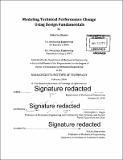Modeling technical performance change using design fundamentals
Author(s)
Basnet, Subarna
DownloadFull printable version (21.41Mb)
Other Contributors
Massachusetts Institute of Technology. Department of Mechanical Engineering.
Advisor
Christopher L. Magee.
Terms of use
Metadata
Show full item recordAbstract
Technical performance improvement exhibits exponential trends, but the rates of improvement for the 28 selected technological domains vary from 3 to 65%. Why does performance improve exponentially? Why do the improvement rates vary widely across the domains? This thesis presents a simple theoretical model that provides an explanatory foundation based on two sets of well-known design fundamentals. The first set conceptualizes inventions arising through combinatorial analogical transfer where new operating ideas are created by combining operating ideas from an existing pool of ideas. This inventive process proceeds on a cumulative basis over time and is perpetuated by injection of basic operating ideas through synergistic exchange between science and technology. The combinatorial analogical transfer coupled with exchange between science and technology naturally leads to exponential behavior. These operating ideas are then embedded in domain artifacts to improve technical performance. Interactions in artifacts and scaling of design variables - two domain specific effects from the second set of design fundamentals- modulate this process. Interactions in artifacts influence the ability of the domains to successfully assimilate the operating ideas. Assimilated ideas change design variables in the artifacts to improve their performance. The relative performance improvement depends on the scaling of design variables of the artifacts. Together these two domain parameters can potentially yield a wide variation in performance improvement rates. According to the model, higher domain interaction parameters retard, whereas higher scaling parameters accelerate, performance improvement rates. The model is shown to be consistent with what is known in the technical change literature. An empirical study tests the model's prediction that higher domain interactions retard performance improvement rates of technological domains. A method for extracting domain interactions using a keyword-based text-mining approach on patents is presented. High normalized counts of keywords representing domain interactions are found to be negatively correlated with low performance improvement rates, thus supporting the model positively. The thesis also presents an independent case study on performance improvement of permanent magnetic materials, and tests two regression models, which predict improvement rates using patent data. Performance of magnetic materials follows an exponential, but halting, improvement trend, and predicted rates from the regression models are consistent with prior result for the 28 technological domains.
Description
Thesis: Ph. D., Massachusetts Institute of Technology, Department of Mechanical Engineering, 2016. Cataloged from PDF version of thesis. Includes bibliographical references (pages 193-204).
Date issued
2016Department
Massachusetts Institute of Technology. Department of Mechanical EngineeringPublisher
Massachusetts Institute of Technology
Keywords
Mechanical Engineering.